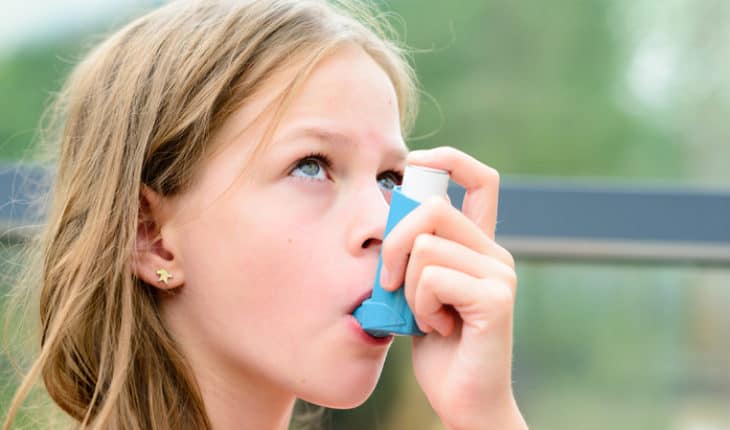Social disadvantage in the UK has a lasting impact on childhood asthma. Children experiencing social disadvantage in their first few years of life have a greatly increased risk of asthma persisting into adulthood.
These are the findings of a study, published today in the journal Thorax, looking at the early life circumstances of thousands of UK children and their risk for persistent asthma as teenagers.
Researchers from Imperial College London and the University of Liverpool used data from almost 7,500 children born in the UK between 2000-2002.
Comparing the relative impacts of a range of early life circumstances on asthma risk (such as birthweight, parental smoking, quality of housing and neighbourhood), their analysis found that being born into disadvantaged circumstances increased the likelihood of developing persistent asthma by 70%, with almost two-thirds (59%) of the risk attributable to early life exposures; before the children reached three years old.
The researchers say their findings highlight how social and economic factors are driving persistent asthma among the most disadvantaged children in the UK.
They add that while the condition is manageable, persistent asthma is still responsible for preventable hospitalisations and deaths, and that the UK has among the worst death rates for asthma in Europe.[1]
“We know that children from poorer backgrounds, who live in disadvantaged circumstances, tend to have a much higher risk of developing asthma, but they also have more asthma attacks,
hospitalisations and are more likely to die from asthma,” said Sonia Saxena, Professor of Primary Care within Imperial’s School of Public Health.
“What this study shows is that social and economic disadvantage overwhelmingly takes hold early in life, in the first few years, and has a potential life-long impact on respiratory and general health.”
DISADVANTAGE IN EARLY YEARS
In the study, the team looked at a cohort of 7,487 children from England, Scotland, Wales and Northern Ireland, born between 2000-2002, taking data at multiple timepoints throughout their lives (at 9 months, and then 3, 5, 7, 11 and 14 years).
Children were allocated to six groups, based on their mother’s level of education: 1) higher degree or first-degree qualifications; 2) diploma in higher education; 3) A levels; 4) GCSEs (grades A-C); 5) GCSEs (grades D-G); 6) None of these qualifications.
The researchers explain that maternal educational status is a strong proxy for social disadvantage, that tends to cluster from an early age. For example, mothers with the lowest educational attainment are more likely to live in low-income households, where housing conditions are poor overcrowded or damp. Their children are more likely to have passive exposure to cigarette smoke or pollution from living in a polluted or high traffic neighbourhood where air quality is poorest.
By tracking the group from infancy up until the age of 14, they compared the impact of a range of physical, socioeconomic and environmental factors, such as birthweight, whether they were breastfed, family size, and if their parents smoked, as well as wider environmental factors such as housing conditions, proximity to main roads, and neighbourhood.
They found that by age 14, the prevalence of persistent asthma in the most disadvantaged children was 20%, compared with 13% for the most advantaged. Disadvantaged children were more likely to have a younger mother at birth, belong to a minority ethnic group and live in poorer-quality housing and neighbourhoods (e.g. crowded, poor-quality rented accommodation, with no access to a garden, in a built up area, with heavy traffic or poor air quality).
NEW MEASURES NEEDED
According to the researchers, the work highlights the toll that health inequalities in early life have on health in adolescence. They argue that public health measures and policies are urgently needed to support families, address early life behaviours (such as parental smoking), and improve housing conditions for families with children.
Dr Hanna Creese, a Research Associate within Imperial’s School of Public Health, and first author of the study, said: “The wider implication of our work is that if we want to prevent disadvantaged children reaching adolescence and adulthood in worse health than their peers, we need to improve conditions during pregnancy and childhood to support the healthy development of children and reduce inequalities across the life course. This means fundamental changes to housing, education and social care.”
Professor Saxena added: “Our work highlights the biggest impact on childhood asthma is coming from the types of exposures you get when you don’t have any control over the environment in which you are raising your child.
“If the government is serious about ‘levelling up’ the UK, it needs to start right at the beginning of life, to ensure children start on an equal footing.”
The research was funded by the National Institute for Health Research, through the Harnessing Data for Child Health work programme in the NIHR School for Public Health Research.
‘Disadvantage in early-life and persistent asthma in adolescents: a UK cohort study’ by Hanna Creese, et al. is published in Thorax.
1 – Asthma UK, 2018 Report –
https://www.asthma.org.uk/about/media/news/press-release-uk-asthma-death-rates-among-worst-in-europe/
- New lipid-based pathway discovered as key to memory formation - 25th June 2025
- Crucial link could explain how Alzheimer’s takes hold - 25th June 2025
- Understanding Your Mind Can Improve Daily Life - 25th June 2025







